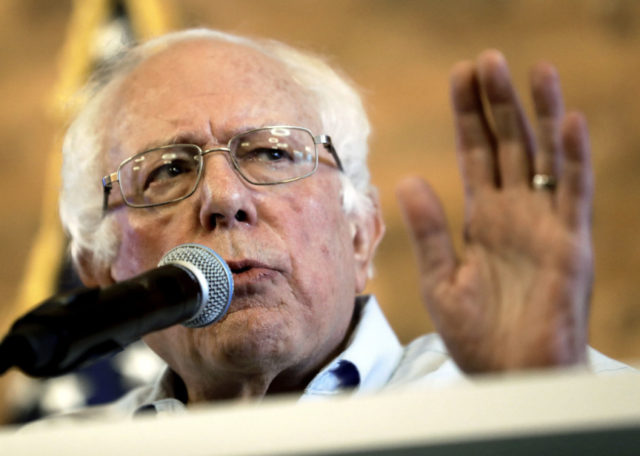Speaking Tuesday before the Johns Hopkins University School of Advanced International Studies, Democratic socialist Sen. Bernie Sanders (I-VT) reversed course from his decades-old protectionist trade policy position, calling for the U.S., China and other countries to develop “an international progressive community that stands for social, economic, racial, and religious justice for all.”
Sanders told students of the university’s world-renowned foreign relations program:
It is time for us to stand up and say, ‘there is a better way to use our wealth.’ Let me simply say, that in order to effectively combat the forces of global oligarchy and authoritarian, we need an international movement that mobilizes behind a vision of shared prosperity, security, and dignity for all and that address the global inequality that exists not only in wealth but in political power.
Sanders continued on the importance of thinking “creatively and boldly” about ushering in a new world order against the rising threat of authoritarian regimes intent on maximizing their “access to power and wealth,’ specifically calling on the U.S. and China to put their policy differences aside to take on climate change. Sanders said:
While the authoritarian axis is committed to tearing down a post-World-War II global order that they see as limiting their access to power and wealth, it is not good enough for us to simply defend that order as it exists. We must look honestly at how that order has failed to deliver on many of its promises and how authoritarians have adeptly exploited those failures in order to built support for there agenda. We must take the opportunity to reconceptualize ‘global order’ based on human solidarity, based on the understanding that it’s not me against you or the United States against China, but that we as a world are special with the threat of climate change are in it together, that in many ways we are going to survive by working together or we’re going to go down by the types of divisions that the authoritarians are trying to create.
“We know that those forces are working today across national borders and we must do the same and create an international progressive community that stands for social, economic, racial and religious justice for all,” he concluded.
Sanders remarks signal a departure from the Democrat socialist’s hawkish stance on U.S. trade relations with Beijing, which have previously included cracking down on U.S. companies shifting to China and labeling the country as a currency manipulator.
Asked during a February 2016 debate where he stood on free trade, Sanders drew a stark contrast to himself from his Democratic primary opponent Hillary Clinton, declaring he did not support “unfettered” access to U.S. markets and called for “fair trade which works for the middle class and working families, not just large multinational corporations.”
Later in the debate, Sanders, a staunch critic of the now-defunct Trans-Pacific Partnership (TPP), vowed to stop Corporate America from sending jobs to China in search of lower wages. “I will do my best to transform our trade policy and take on these corporations who want to invest in low-income countries around the world rather than in the United States of America,” said Sanders.
Sanders in 1999 opposed granting China the coveted “Most Favored Nation” status, and a year later, voted against establishing permanent normal trade relations (PNTR) with China, which later caused three million Americans to lose their jobs.

COMMENTS
Please let us know if you're having issues with commenting.